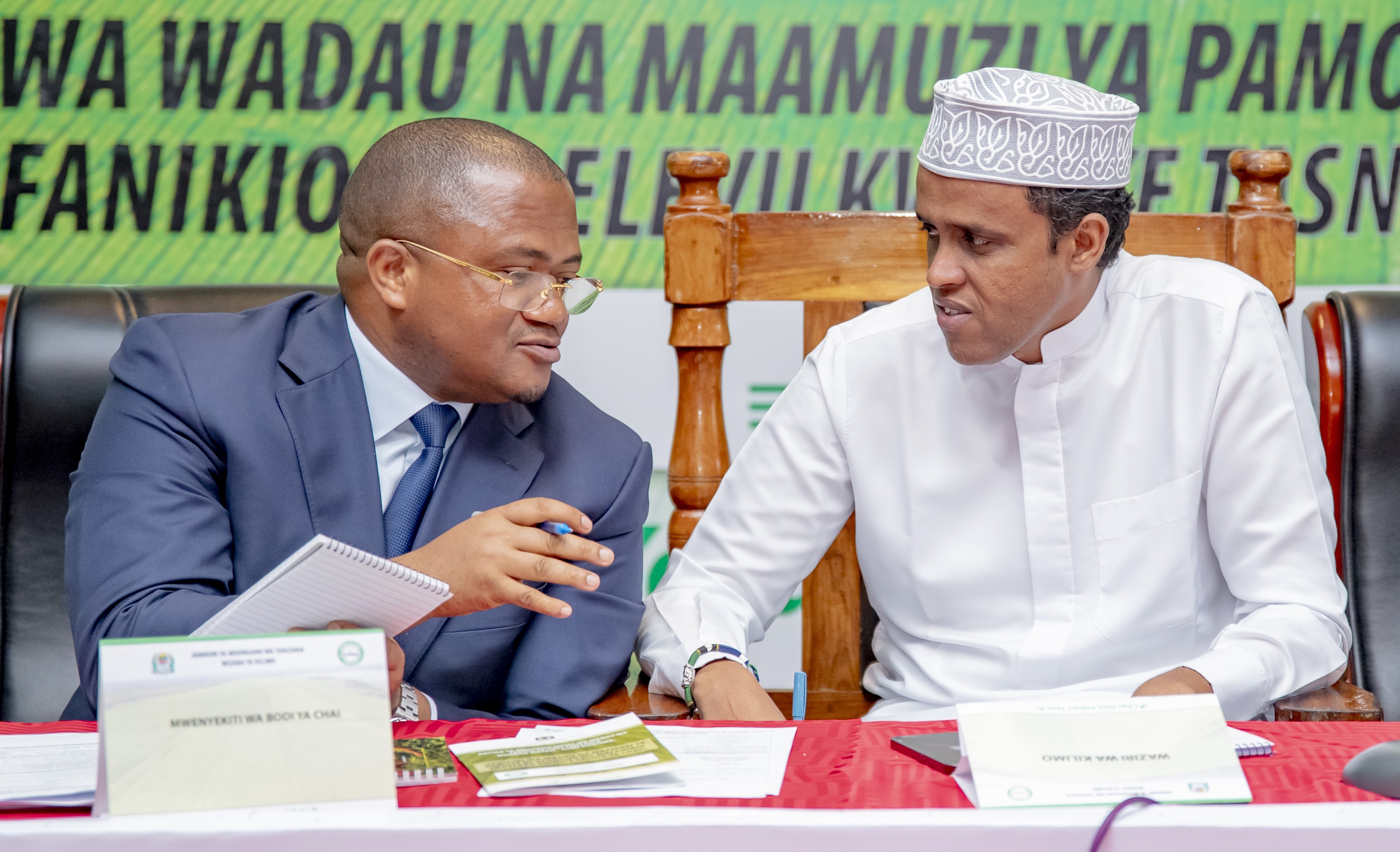Prime
How Tanzania plans to revitalise its tea industry

Agriculture minister Hussein Bashe (right) confers with newly appointed Tea Board of Tanzania (TBT) chairman Abdulmajid Nsekela, who is also CRDB Bank chief executive, during a tea industry stakeholders' meeting in Dodoma on April 8, 2025. PHOTO | COURTESY
What you need to know:
- The government is considering a major overhaul of the tea industry aimed at boosting farmers’ earnings and preventing the collapse of the sector
Dodoma. The government is considering a major overhaul of the tea industry aimed at boosting farmers’ earnings and preventing the collapse of the sector.
The initiative, which will be led by the newly-appointed Tea Board of Tanzania (TBT), focuses on bringing transparency to the pricing structure of green tea leaves.
Launching the new TBT, which is chaired by CRDB Bank Group CEO Abdulmajid Nsekela, in Dodoma on Tuesday, Agriculture minister Hussein Bashe said in its ambitious plan, the government was willing to go an extra mile in aiding the sector’s growth. Speaking at the annual tea stakeholders’ meeting, Mr Bashe said that within two weeks, the government expects a comprehensive breakdown of the factors influencing the cost of green tea leaves per kilogramme.
“The immediate task for you, Mr Nsekela, is to form a team that will conduct an independent analysis of the costs involved in tea production, from the farmers to the factories,” said Mr Bashe, urging the TBT to expedite the process.
He questioned the disconnect between proposed prices and factory owners’ claims that the suggested rate of Sh360 per kilogramme was too expensive for them. “We need transparency in this process to ensure that every factor contributing to the cost is fully understood,” he said.
In a further push to tackle the sector’s challenges, Mr Bashe also directed Mr Nsekela’s team to engage with several tea companies, including Mohammed Enterprises Company Limited (MeTL), DL Company and Wakulima Tea Company (Watco), which have either closed or suspended operations. He stressed the importance of resolving these issues swiftly.
“Ensure that no assets of Watco have been sold off. If they have, those involved must consider themselves as having registered a loss because they will be returned to the government at no additional cost,” said Mr Bashe to the applause of attendees. “If MeTL believes it cannot turn around its operations, they should inform the government so we can step in. For DL Company, the tea industry is vital to Tanzania’s economy, and we need a clear turnaround strategy or a peaceful exit.”
Industry and Trade deputy minister Exaud Kigahe recently gave DL Company a three-month deadline to clear outstanding payments to farmers and workers. Kigahe had warned that the DL Company’s Mufindi tea factory could deteriorate further if these issues were not resolved, urging the company to pay Sh124 million owed to farmers and Sh1.6 billion in workers’ retirement benefits by June 2025.
Mr Nsekela, appointed as TBT chairman in February 2025, expressed confidence that the board could turn the sector around. “We need to involve all stakeholders and ensure no one group benefits disproportionately. By being transparent and listening to all, we will be able to improve the sector,” he said, citing President Samia Suluhu Hassan’s 4Rs (Reconciliation, Resilience, Reform and Rebuild) as a guiding principle for reform.
The TBT, now under new leadership, brings together individuals with expertise from various sectors, including finance, research, marketing and agriculture. This multi-disciplinary approach aims to address the systemic issues that have plagued the industry for years.
As part of the broader strategy, Mr Bashe also tasked the board with reviewing Tanzania’s tea policy and strategic plan to propose solutions to the sector’s long-standing challenges.
Mr Nsekela acknowledged the scale of the task ahead, but expressed optimism, citing his previous experience as chairman of the Tanzania Smallholder Tea Development Agency (TSHTDA) and his current role as chairman of the Tanzania Cooperative Development Commission.
The tea sector in Tanzania employs over 32,000 smallholder farmers and indirectly supports more than two million people. Recent figures from the TBT show that the country earned over Sh50.25 billion from tea exports between December 2024 and March 2025.
Additionally, there is growing interest from both local and international investors in regions such as Kilolo, Njombe, and Mbeya, further fuelling optimism for the sector’s future.
However, local leaders, including Rungwe District Commissioner Jaffer Haniu, said challenges such as low prices for fresh tea leaves and delayed payments to farmers, were discouraging investment in the industry.
In a show of support for the proposed reforms, chairman of Parliament’s Industry, Trade, Agriculture and Livestock Committee Deodatus Mwanyika affirmed that the legislature fully backs the government’s transformative approach to revitalising the tea sector.





